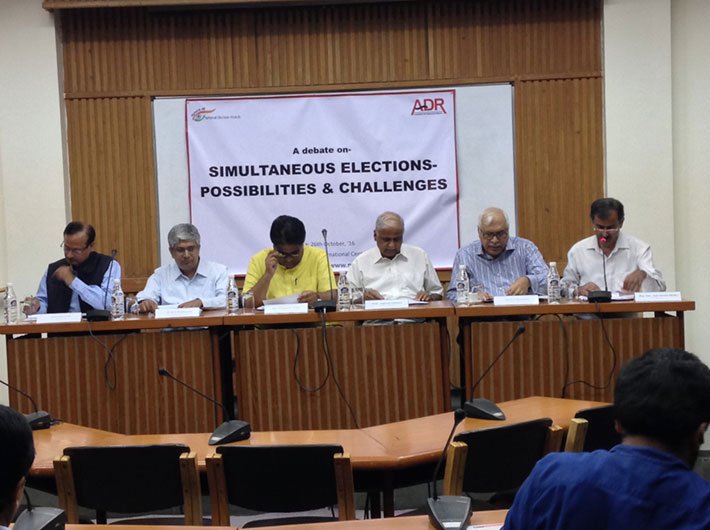As the government pushes for holding general and state elections simultaneously, a discussion brews up in the capital
The debate over holding simultaneous elections in the country, i.e. conducting both general and state elections at the same time, has of lately taken flight. Last year, the Standing Committee on Personnel, Public Grievances, Law and Justice submitted its report on the feasibility of holding simultaneous elections and later this year, the prime minister pitched for the concept, beginning a public discussion on the MyGov web portal on the issue.
On Wednesday, a discussion was organised by Association for Democratic Reforms (ADR) at the India International Centre on the possibility of having simultaneous elections in India and the challenges involved.
Also read: Case for synchronising election cycles
Emphasising the significance of elections, ADR’s founder-trustee Prof Jagdeep Chhokar said that “elections are the most fundamental way of operationalising democracy” and that “the discussion was an attempt to make an informed choice regarding the simultaneous elections”.
Speaking on the possibilities of holding simultaneous elections, Rajya Sabha MP Bhupender Yadav said, “…Elections are the means towards the end of serving the people. However, nowadays elections have become an end in itself.” He claimed that constant elections throughout the year all the over country act as a hindrance in the working of the government. He suggested that simultaneous elections will solve this problem and that “there should be a pre-defined schedule for the elections and uniformity”.
Dr SY Quraishi, former CEC, began by clarifying that “this issue is not politically motivated”. Although he appreciated the idea of simultaneous election, he mentioned that there is no clarity on how it will be implemented. He said, “…elections have become the root cause of corruption in the country.” He also emphasised that “caste, religion and communal issues are perpetuated by constant elections”.
Prof Sanjay Kumar, director of Centre for Study of Developing Societies, speaking on the challenges, said that “efforts should be made to hold simultaneous elections in those state assemblies which are completing their tenure together rather than forcing simultaneous elections by law”. He stated that a study by CSDS of 31 assembly elections that were held along with Lok Sabha elections from 1989 to 2014 shows that in 24 instances/elections the major political parties polled almost a similar proportion of votes both for the assembly and the Lok Sabha, while only in seven instances was the choice of voters somewhat different.
He added that if elections are held separately then regional parties have a better scope of winning. “Simultaneous elections will curb the voice of people living at the margins of the society by strangulating the scope for regional parties which reflect local aspirations/issues. This will reverse the process of deepening democracy,” he concluded.
Dr MR Madhavan, president of PRS Legislative Research, explained that when the public is deeply swayed towards a party, there might be more chances of the party winning not only during the general elections but also any assembly elections held around the same time which could drastically affect the role of the regional parties representing the marginalised communities of the country.
Quoting Praveen Chakravarty’s paper which analysed the possible effect of simultaneous elections on voter behaviour, he added, “The paper analysed the 2,600 assembly constituencies in 16 elections and during simultaneous election, 77 percent of the time the same party was chosen in the assembly constituency as well as the parliament and in non-simultaneous elections, the difference was 61 percent”.
